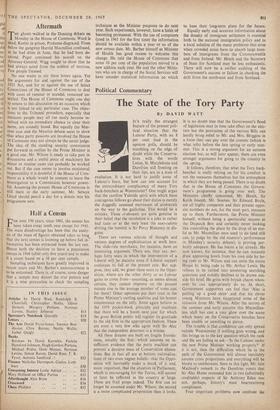Aftermath
hc:
THE ghosts walked in the Denning debate on Monday in the House of Commons. Ward is dead, Keeler in prison, Profumo disgraced. From below the gangway Harold Macmillan confessed, as he had done in June, that he had been de- ceived. Paget continued his assault on the Attorney-General. Wigg sought to show that he had always acted from the noblest of motives. Few people listened.
No one wants to stir these bones again. Yet the arguments for and against the use of the 1921 Act, and for or against the use of Select Committees of the House of Commons to deal with cases of rumour or scandal, remained un- settled. The House of Commons ought one day to return to this discussion on an occasion which is not linked to any particular case. The objec- tions to the Tribunal procedure, especially that Innocent people may all too easily become in- volved with no immediate chance to clear their name, are soundly based. But equally the Mar- coni case and the Maurice debate seem to show that when party passions are involved the House of Commons may not always be the surest judge. The idea of the standing security commission Put forward in outline by the Prime Minister is a good one. Mr. Wilson is ready to take part in discussions and a useful piece of machinery for minor or routine cases can probably be worked out. But if the case seems to involve ministerial responsibility it is doubtful if the House of Com- mons as a whole would be content to leave the Investigation to a Commission however power- ful. Assuming the present House of Commons is still there in the early summer, Mr. Selwyn Lloyd should pencil a day for a debate into his Programme now. H- of n-
ty
0(1. ly ty, al it :e.
Is it






























 Previous page
Previous page